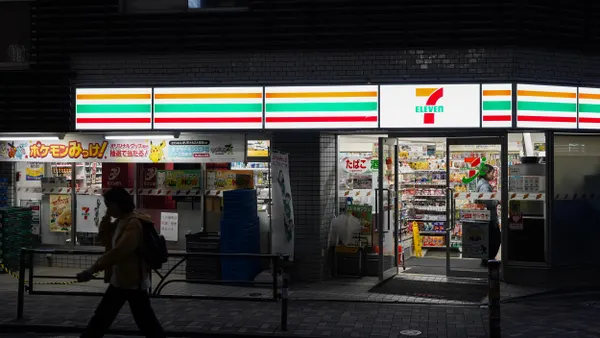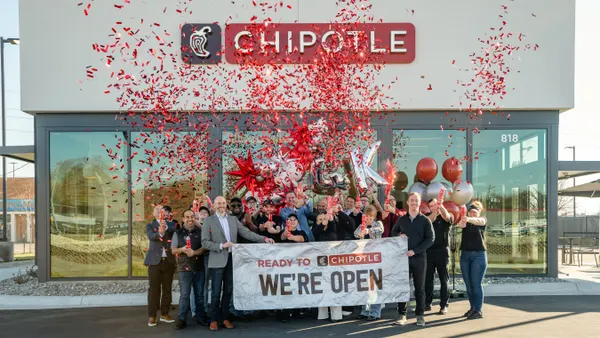UPDATE, March 27, 2020: The Cheesecake Factory has furloughed about 41,000 hourly restaurant staff members, according to an SEC Filing. These employees will retain their benefits and insurance until June 1, 2020 and will receive daily complimentary meals from their restaurants. The CEO and other named executive officers have elected to reduce their base salaries by 20% effective April 1 and the restaurant's board of directors has elected to take a 20% reduction in annual cash retainer fees. The company is in discussions with its landlords regarding ongoing rent obligations, including potential deferral, abatement and/or restructuring of rent.
Dive Brief:
- The Cheesecake Factory CEO David Overton sent a letter to all of the company's landlords last week informing them that the company will not be able to make rent payments for its nearly 300 restaurants on April 1 because a “severe decrease in restaurant traffic has severely decreased our cash flow and inflicted a tremendous financial blow to our business,” Eater Los Angeles reports. The letter also includes that the company’s affiliated restaurants, such as Rock Sugar and North Italia, will not be able to pay rent either.
- In a statement provided to Eater Los Angeles, the company said it has strong and longstanding relationships with its landlords, adding “we are certain that with their partnership, we will be able to work together to weather this storm in the appropriate manner.”
- In a March 23 press release, The Cheesecake Factory announced it is curbing new restaurant development and tapping into a $90 million credit line to increase its cash on hand.
Dive Insight:
Like other casual dining chains, The Cheesecake Factory has shifted some locations to a takeout/delivery-only model to navigate lost traffic as states shut down dine-in business. But such a pivot hasn’t stopped hemorrhaging sales at the chain, which has temporarily closed 27 locations since the beginning of the coronavirus outbreak. Other chains have also furloughed employees, including J. Alexander's, as a way to reduce costs while their dining rooms remain closed.
The restaurant’s inability to pay rent illustrates just how tough this recovery is going to be for the entire industry. With closures and a massive drop-off in traffic, cuts will have to come from somewhere, and many concepts will likely look at occupancy rates, which average 9% to 12% for restaurants, before having to cut people. But if a large, well-capitalized chain can’t make its rent, what does that mean for smaller companies or independents — which make up a majority of the industry — that don’t have an ability to draw down on their credit lines?
The $2.2 trillion coronavirus stimulus package passed by the Senate Wednesday could help, but the pool of businesses in need is wide and that relief package doesn’t directly address rents. The company’s $90 million credit facility could also help, but rent isn’t the only expense that has to be covered. There are also nearly 38,000 employees at The Cheesecake Factory.
The Cheesecake Factory is not alone here. Bloomberg reported that Subway and Mattress Firm are two other companies that have informed their landlords they will withhold rent in the coming months. No doubt this is just the tip of the iceberg for businesses unable to meet their rent obligations, which will likely push the commercial real estate market in a tailspin and force a significant amount of restaurant closures once the dust clears. The forecast is ominous: U.S. restaurant profits could decline as much as 20% over the next 12 months depending on how long restaurant closures and restrictions remain in place, according to a Moody's report.
Still, in its March 23 press release, Overton touted optimism, noting that “With 42 years of history as a guide, we believe we will overcome these challenging near-term operating conditions and be even better positioned for the long term.” Prior to the pandemic, the chain was still seeing sales increases and opening new stores. In 2019, it opened five restaurants and year-over-year comp sales were up 0.8% from 2018.










